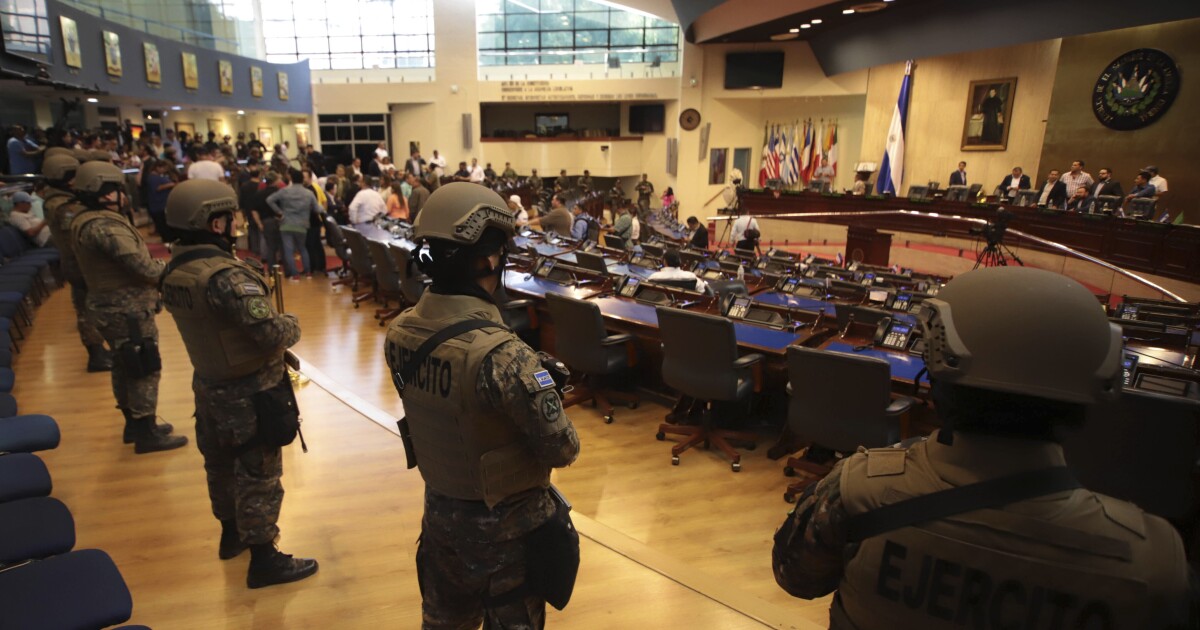The United States is reducing foreign military aid to El Salvador, despite President Nayib Bukele’s intense lobbying in Washington to contain criticism that he has taken his country on an authoritarian path.
Stuck in overheads and the COVID-19 relief bill signed on Sunday by President Trump, there was a clause that prevented El Salvador – and also Guatemala and Honduras – from accessing a State Department program that finances the purchase of US defense equipment.
The ban – promoted by Congresswoman Norma Torres (D-Pomona), the only Central American immigrant serving in Congress – is part of an initiative by House Democrats to strengthen anti-corruption efforts in Central America.
While much greater US security aid channeled through the Pentagon to combat drug trafficking is unaffected, the ban is nevertheless a symbolic blow to countries trying to show progress in strengthening the rule of law, said Adam Isacson of Washington office in Latin America.
“Basically, it puts these countries on the same level as dictatorships and failed states,” said Isacson, an expert on defense spending. “Only a few countries are not eligible for this program.”
Israel, Egypt and more than a dozen other countries receive about $ 5.6 billion annually through the State Department’s Foreign Military Finance program to finance purchases of US military equipment and services. El Salvador has received about $ 15 million through the program since 2016, including $ 1.9 million this year. Honduras and Guatemala received this type of funding for the last time in 2018.
Milena Mayorga, who this month became El Salvador’s ambassador to Washington, said she was surprised by the restriction, which she said went against decades of close military cooperation between the two countries. El Salvador was one of the few Latin American nations to join the US-led coalition that invaded Iraq in 2003, and the country’s international airport is one of only two in Latin America used by the US military to carry out anti-narcotics missions. in the region.
“It is vitally important that this decision is reconsidered,” said Mayorga. “Our military will always need certain tools to combat insecurity.”
Bukele took office in 2019 promising to rescue El Salvador from the deep divisions left by uncontrolled gang violence and systemic corruption in right and left governments that followed the end of a bloody 1992 civil war.
It remains popular at home thanks to a sharp drop in one of the highest homicide rates in the world. But in Washington, he drew criticism from Democrats and some Republicans for his aggressive tactics, such as his decision to send heavily armed troops to the Salvadoran Chamber of Congress last February to pressure lawmakers to approve a loan to finance the fight against gangs.
Mayorga said the traditional parties that dominated El Salvador’s congress spared no effort in trying to portray Bukele as an autocrat. But she said that many of the president’s initiatives, such as inviting the Organization of American States to lead a commission to investigate bribery, fit the United States Congress’ anti-corruption concerns.
“Now is when we need US support the most,” said Mayorga, a former popular TV news anchor who, as a legislator, furiously separated from her conservative party at the Arena to support Bukele.
The Bukele government has tried to improve its position in Washington by signing lobbying contracts worth more than $ 1.6 million with three different firms in Washington since August.
Also included in the federal spending account is a clause that threatens sanctions directed at government officials in the so-called Northern Triangle countries – El Salvador, Guatemala and Honduras – which are considered to have undermined democratic institutions. He demands that the President of the United States present a public list of corrupt individuals within the next 180 days. This is expected to include some of the region’s most powerful politicians, some of whom have been suspected for years for having links to drug traffickers.
Foreign aid to Central America has been the subject of much bargain in recent years. Trump in 2019 suspended aid to several countries due to the continued flow of migrants from the region.
Bukele was able to resume aid by signing an agreement that allows the United States to send asylum seekers from other countries to El Salvador, paving the way for an era of close cooperation with the Trump administration. But even Trump officials in May quietly expressed concern that Bukele’s challenge to El Salvador’s congress and Supreme Court threatened his eligibility for anti-poverty assistance.
President-elect Joe Biden has made Central America one of his foreign policy priorities in the Western Hemisphere. It is not clear whether he will agree with the decision to reduce military aid to the North Triangle. As vice president, he aggressively pushed a $ 750 million package into the region to tackle the root causes of migration – poverty and violence – and as president he promised to expand aid to $ 4 billion.
